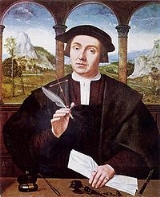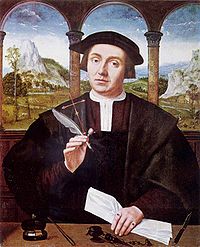
History of the legal profession
Encyclopedia

Ancient Greece
The earliest people who could be described as "lawyers" were probably the orators of ancient AthensAthens
Athens , is the capital and largest city of Greece. Athens dominates the Attica region and is one of the world's oldest cities, as its recorded history spans around 3,400 years. Classical Athens was a powerful city-state...
(see History of Athens
History of Athens
Athens is one of the oldest named cities in the world, having been continuously inhabited for at least 7000 years. Situated in southern Europe, Athens became the leading city of Ancient Greece in the first millennium BCE and its cultural achievements during the 5th century BCE laid the foundations...
). However, Athenian orators faced serious structural obstacles. First, there was a rule that individuals were supposed to plead their own cases, which was soon bypassed by the increasing tendency of individuals to ask a "friend" for assistance. However, around the middle of the fourth century, the Athenians disposed of the perfunctory request for a friend. Second, a more serious obstacle, which the Athenian orators never completely overcame, was the rule that no one could take a fee to plead the cause of another. This law was widely disregarded in practice, but was never abolished, which meant that orators could never present themselves as legal professionals or experts. They had to uphold the legal fiction
Legal fiction
A legal fiction is a fact assumed or created by courts which is then used in order to apply a legal rule which was not necessarily designed to be used in that way...
that they were merely an ordinary citizen generously helping out a friend for free, and thus they could never organize into a real profession—with professional associations and titles and all the other pomp and circumstance—like their modern counterparts. Therefore, if one narrows the definition to those men who could practice the legal profession openly and legally, then the first lawyers would have to be the orators of ancient Rome
Ancient Rome
Ancient Rome was a thriving civilization that grew on the Italian Peninsula as early as the 8th century BC. Located along the Mediterranean Sea and centered on the city of Rome, it expanded to one of the largest empires in the ancient world....
.
Ancient Rome
A law enacted in 204 BC barred Roman advocates from taking fees, but the law was widely ignored. The ban on fees was abolished by Emperor ClaudiusClaudius
Claudius , was Roman Emperor from 41 to 54. A member of the Julio-Claudian dynasty, he was the son of Drusus and Antonia Minor. He was born at Lugdunum in Gaul and was the first Roman Emperor to be born outside Italy...
, who legalized advocacy as a profession and allowed the Roman advocates to become the first lawyers who could practice openly—but he also imposed a fee ceiling of 10,000 sesterces
Sestertius
The sestertius, or sesterce, was an ancient Roman coin. During the Roman Republic it was a small, silver coin issued only on rare occasions...
. This was apparently not much money; the Satires of Juvenal complain that there was no money in working as an advocate.
Like their Greek contemporaries, early Roman advocates were trained in rhetoric
Rhetoric
Rhetoric is the art of discourse, an art that aims to improve the facility of speakers or writers who attempt to inform, persuade, or motivate particular audiences in specific situations. As a subject of formal study and a productive civic practice, rhetoric has played a central role in the Western...
, not law, and the judges before whom they argued were also not law-trained. But very early on, unlike Athens, Rome developed a class of specialists who were learned in the law, known as jurisconsults (iuris consulti). Jurisconsults were wealthy amateurs who dabbled in law as an intellectual hobby; they did not make their primary living from it. They gave legal opinions (responsa) on legal issues to all comers (a practice known as publice respondere). Roman judges and governors would routinely consult with an advisory panel of jurisconsults before rendering a decision, and advocates and ordinary people also went to jurisconsults for legal opinions. Thus, the Romans were the first to have a class of people who spent their days thinking about legal problems, and this is why their law became so "precise, detailed, and technical."
During the Roman Republic
Roman Republic
The Roman Republic was the period of the ancient Roman civilization where the government operated as a republic. It began with the overthrow of the Roman monarchy, traditionally dated around 508 BC, and its replacement by a government headed by two consuls, elected annually by the citizens and...
and the early Roman Empire
Roman Empire
The Roman Empire was the post-Republican period of the ancient Roman civilization, characterised by an autocratic form of government and large territorial holdings in Europe and around the Mediterranean....
, jurisconsults and advocates were unregulated, since the former were amateurs and the latter were technically illegal. Any citizen could call himself an advocate or a legal expert, though whether people believed him would depend upon his personal reputation. This changed once Claudius legalized the legal profession. By the start of the Byzantine Empire
Byzantine Empire
The Byzantine Empire was the Eastern Roman Empire during the periods of Late Antiquity and the Middle Ages, centred on the capital of Constantinople. Known simply as the Roman Empire or Romania to its inhabitants and neighbours, the Empire was the direct continuation of the Ancient Roman State...
, the legal profession had become well-established, heavily regulated, and highly stratified. The centralization and bureaucratization of the profession was apparently gradual at first, but accelerated during the reign of Emperor Hadrian
Hadrian
Hadrian , was Roman Emperor from 117 to 138. He is best known for building Hadrian's Wall, which marked the northern limit of Roman Britain. In Rome, he re-built the Pantheon and constructed the Temple of Venus and Roma. In addition to being emperor, Hadrian was a humanist and was philhellene in...
. At the same time, the jurisconsults went into decline during the imperial period.
In the words of Fritz Schulz, "by the fourth century things had changed in the eastern Empire: advocates now were really lawyers." For example, by the fourth century, advocates had to be enrolled on the bar of a court to argue before it, they could only be attached to one court at a time, and there were restrictions (which came and went depending upon who was emperor) on how many advocates could be enrolled at a particular court. By the 380s, advocates were studying law in addition to rhetoric (thus reducing the need for a separate class of jurisconsults); in 460, Emperor Leo imposed a requirement that new advocates seeking admission had to produce testimonials from their teachers; and by the sixth century, a regular course of legal study lasting about four years was required for admission. Claudius's fee ceiling lasted all the way into the Byzantine period, though by then it was measured at 100 solidi
Solidus (coin)
The solidus was originally a gold coin issued by the Romans, and a weight measure for gold more generally, corresponding to 4.5 grams.-Roman and Byzantine coinage:...
. Of course, it was widely evaded, either through demands for maintenance and expenses or a sub rosa barter transaction. The latter was cause for disbarment.
The notaries (tabelliones) appeared in the late Roman Empire. Like their modern-day descendants, the civil law notaries, they were responsible for drafting wills, conveyances, and contracts. They were ubiquitous and most villages had one. In Roman times, notaries were widely considered to be inferior to advocates and jurisconsults. Roman notaries were not law-trained; they were barely literate hacks who wrapped the simplest transactions in mountains of legal jargon, since they were paid by the line.
Middle Ages
After the fall of the western Empire and the onset of the Dark Ages, the legal profession of Western Europe collapsed. As James Brundage has explained: "[by 1140], no one in Western Europe could properly be described as a professional lawyer or a professional canonist in anything like the modern sense of the term 'professional.' " However, from 1150 onward, a small but increasing number of men became experts in canon lawCanon law
Canon law is the body of laws & regulations made or adopted by ecclesiastical authority, for the government of the Christian organization and its members. It is the internal ecclesiastical law governing the Catholic Church , the Eastern and Oriental Orthodox churches, and the Anglican Communion of...
but only in furtherance of other occupational goals, such as serving the Roman Catholic Church
Roman Catholic Church
The Catholic Church, also known as the Roman Catholic Church, is the world's largest Christian church, with over a billion members. Led by the Pope, it defines its mission as spreading the gospel of Jesus Christ, administering the sacraments and exercising charity...
as priests. From 1190 to 1230, however, there was a crucial shift in which some men began to practice canon law as a lifelong profession in itself.
The legal profession's return was marked by the renewed efforts of church and state to regulate it. In 1231 two French councils mandated that lawyers had to swear an oath of admission before practicing before the bishop's courts in their regions, and a similar oath was promulgated by the papal legate in London in 1237. During the same decade, Frederick II, the emperor of the Kingdom of Sicily, imposed a similar oath in his civil courts. By 1250 the nucleus of a new legal profession had clearly formed. The new trend towards professionalization culminated in a controversial proposal at the Second Council of Lyon
Second Council of Lyon
The Second Council of Lyon was the fourteenth ecumenical council of the Catholic Church, convoked on 31 March 1272 and convened in Lyon, France, in 1274. Pope Gregory X presided over the council, called to act on a pledge by Byzantine emperor Michael VIII to reunite the Eastern church with the West...
in 1275 that all ecclesiastical courts should require an oath of admission. Although not adopted by the council, it was highly influential in many such courts throughout Europe. The civil courts in England also joined the trend towards professionalization; in 1275 a statute was enacted that prescribed punishment for professional lawyers guilty of deceit, and in 1280 the mayor's court of the city of London promulgated regulations concerning admission procedures, including the administering of an oath.

